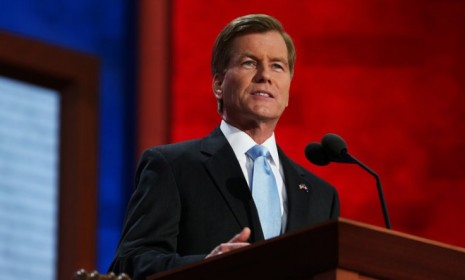4 reasons why Republicans can be hopeful about the future
In the wake of Obama's re-election, the GOP has become the party of doom and gloom. But there are still silver linings in an otherwise cloudy horizon

A free daily email with the biggest news stories of the day – and the best features from TheWeek.com
You are now subscribed
Your newsletter sign-up was successful
The conventional wisdom is that things are looking pretty grim for the Republican Party these days. With President Obama soundly defeating Mitt Romney in the presidential race — the fifth time that a Democrat has won the popular vote in the last six elections — the GOP has been forced to acknowledge that the majority of the country is drifting away from its platform. The Republican base is shrinking and getting older, while the Democrats' tent, packed with younger voters and Latinos, has great potential to expand in the coming elections. But as the GOP begins what promises to be a painful civil war over the future direction of the party, there are some bright spots to give Republicans hope. Here are four:
1. The GOP has a deep bench of up-and-coming stars
"The party's superstars are coming of age," says Chris Cillizza at The Washington Post. The Republican primary field in 2012 was exceptionally weak, with a frontrunner no one could love, and a host of fringe figures — Herman Cain, anyone? — who never had a chance against Obama. The GOP's 2016 stable potentially includes a slate of solid governors — Bob McDonnell of Virginia, Bobby Jindal of Louisiana, Chris Christie of New Jersey — as well as prominent figures in Washington, such as Sen. Marco Rubio (Fla.) and Rep. Paul Ryan (Wis.). All of them "have significantly more star power than Romney," says Cillizza.
The Week
Escape your echo chamber. Get the facts behind the news, plus analysis from multiple perspectives.

Sign up for The Week's Free Newsletters
From our morning news briefing to a weekly Good News Newsletter, get the best of The Week delivered directly to your inbox.
From our morning news briefing to a weekly Good News Newsletter, get the best of The Week delivered directly to your inbox.
2. The party has a coherent rationale for change
The GOP is losing badly among women, younger voters, and Latinos, one of the country's fastest-growing ethnic groups. But the "party's imminent death due to demographic changes has been greatly exaggerated," says Gary Younge at Britiain's The Guardian. "It doesn't take a great leap of imagination to see how" the GOP could justify immigration reform with free market orthodoxy, since "allowing cheap labor for farms and industry" would be far more palatable than "an expensive, ineffective big government project to build a wall along the border." Furthermore, the party's position on gay marriage and abortion "are an awkward fit with its hostility to government intervention." The Republican Party is far more flexible than most people believe.
3. The Democrats may have their own civil war
"Don't forget, whatever happens on the GOP side, the Democrats will have their own primary battle" come 2016, say Christina Bellantoni and Katelyn Polantz at PBS News Hour. Vice President Joe Biden has hinted that he could run, while other Dems hope that Secretary of State Hillary Clinton will put her hat in the ring. And there are a host of governors and senators who could also run in 2016, all of whom could expose fissures in a coalition that has held up remarkably well under Obama.
A free daily email with the biggest news stories of the day – and the best features from TheWeek.com
4. The electoral map isn't that forbidding
From 1968 to 1988, when the Democratic Party for the most part was lost in the political wilderness, "Democratic presidential nominees averaged a paltry 113 electoral votes," says Cillizza. "From 1992 to 2012, Republicans have averaged a much more robust 210." In a severely divided country, the GOP still has a strong base of support to build on, meaning the "party is not that far, electorally speaking, from creating a credible path back to the 270 electoral votes" needed to win the presidency. If the GOP can "find a way to make the industrial Midwest — Ohio, Iowa, Wisconsin, and even Pennsylvania — competitive again... the map suddenly doesn't look so bad."